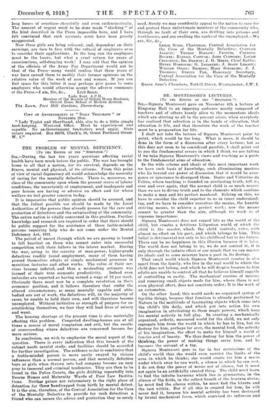THE PROBLEM OF MENTAL DEFICIENCY. [To THE EDITOR OF THE
" SPECTATOR."] SIR,—During the last few years questions affecting racial health have been much before the public. The war has brought home to all that a nation, for its survival, depends on the fitness, mental and physical, of its citizens. From this point of view of racial degeneracy all would acknowledge the necessity of caring for the mentally defective. There is, moreover, no class of the community upon whom the present stress of labour conditions, the uncertainty of employment, and inadequate and poor houses are having so adverse an effect and for whose welfare we feel greater concern to-day.
It is imperative that public opinion should be aroused, and that the fullest possible use should be made by the Local Authorities of the powers they already possess for the care and protection of defectives and the safeguarding of the community. The entire nation is vitally concerned in this problem. Further knowledge and research are required in order that there should be public support for the assistance of those feeble-minded persons requiring help who do not come under the Mental Deficiency Act, 1913.
The period of unrest through which we are passing is bound to fall heaviest on those who cannot enter into successful competition with their fellows in the labour market. During the war, owing to the scarcity of man-power, higher-grade defectives readily found employment, many of them having proved themselves adepts at simple mechanical processes in munition factories and other works. The value of their ser- vices became inflated, and thus a misleading estimate was
formed of their true economic productivity. Indeed even imbeciles are reported as having earned a wage of £2 per week. Obviously there must now he a complete revolution in their economic position, and it follows therefore that under the altered circumstances, as many mentally capable and able- bodied are out of work, the defectives will, in the majority of cases; be unable to hold their own, and will therefore become unemployed. Without initiative or strength of purpose for re- establishing themselves, we fear they will lead lives of misery and want.
The housing shortage at the present time is also materially affecting this problem. Congested dwelling-houses are at all times a source of moral temptation and evil, but the results of overcrowding where defectives are concerned become far more serious.
In conclusion, we wish to emphasize the moral aspect of the question. There is every indication that this branch of the subject needs careful study, and facilities should be accorded for further investigation. The evidence so far is conclusive that a feeble-minded person is more easily swayed by vicious influences than a normal person, and that mentally defective boys or girls when thrown into bad company become an easy prey to immoral and criminal tendencies. They are then to be found in the Police Courts, the girls drifting repeatedly into Rescue Homes and Maternity Wards of Poor Law Institu- tions. Neither prison nor reformatory is the right place of detention for those handicapped from birth by mental defect. It is the aim, therefore, of the Central Association for the Care of the Mentally Defective to provide for such defectives a friend who can secure the advice and protection they so sorely
need. Surely we may confidently appeal to the nation to care for and protect these unfortunate members of the community who. through no fault of their own, are drifting into prisons and workhouses, and are swelling the ranks of the unemployed.—We are, Sir, &c.,
LESLIE Scorr, Chairman, Central Association for the Care of the Mentally Defective; Ccrsroan ALLBUTT; THOMAS BARLOW; FRANCIS, CARDINAL BOURNE; RANDALL CANTUAR; JOHN CLIFFORD; LOUISE CREIGHTON; IDA DARWIN; J. H. HERTZ, Chief Rabbi; HENRY HOBITOUSE; G. LANSIDTRY; J. SCOTT LIDGETT; WILLIAM OSLER; READING; MARY SCHARLIEB; J. J. THOMSON; EVELYN Fox, Honorary Secretary, Central Association for the Care of the Mentally Defective.
Queen Anne's Chambers, Toth ill Street, Westminster, S.W. 1.














































 Previous page
Previous page